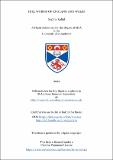Hill worms of England and Wales
Abstract
I believe part of the drive in my writing is an impulse to define poetry. The desire to fully satisfy
this curiosity is something I find endlessly interesting, and amusing. In conclusion, I have found
that a creative approach is the only authentic response. Therefore, my thesis has come to
represent a personal exploration towards this interest. I have used my writing to flesh out what
this might mean and always had the ambition these poems would add further mystery to the
question. This is the underlying ethos of my work. Here, I attempt to sometimes communicate
feeling more than sense, sensation over rational thought – all things I find poetry satisfies in
myself. This has encouraged me to use sound and sense in experimental ways, as well as further
investigate the spaces created by the imagination in the normal workaday reality of the world. As
a result, I discovered a surreal approach comes very naturally to me. However, I strive to create a
balance as well as a unique take towards this style. I think poetry should be fun to read, too.
Quiet and loud. Abstract and grounded. And I assert that prose poems can be just as poetical as
more recognisable forms. Just like the mythical hill worms talked about in ancient folklore, I
think poetry should be intangible and mysterious. Funny and profound. This also ties into other
themes which encourage my writing: childhood, imagination, love, art, animals, hobbies, our
environment, and perhaps an overarching theme of how our individuality interacts within these –
what I believe to be – spiritual spheres. And whether individuality as well as the imagination, like
poetry, is something that cannot be specified, and is perhaps, moreover, a complex, evolving idea
involving our geography and our shared and personal histories.
Type
Thesis, MFA Master of Fine Arts
Rights
Creative Commons Attribution-NonCommercial-NoDerivatives 4.0 International
http://creativecommons.org/licenses/by-nc-nd/4.0/
Collections
Except where otherwise noted within the work, this item's licence for re-use is described as Creative Commons Attribution-NonCommercial-NoDerivatives 4.0 International
Items in the St Andrews Research Repository are protected by copyright, with all rights reserved, unless otherwise indicated.


